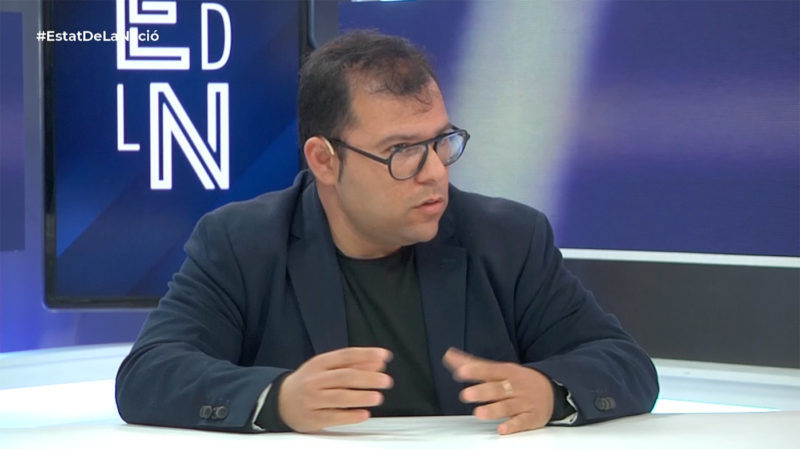

The Spanish state wants to spy on your messages
A document leaked in Wired magazine shows how Spain is taking a stand against end-to-end encryption on messaging platforms such as WhatsApp, putting the privacy of millions of citizens at risk.
Spain is the European Union country with the most radical position against end-to-end encryption on messaging platforms such as WhatsApp and Telegram. This came to light in the document of the Council of the European Union leaked by Wired. “In our view, the ideal would be to legislatively prevent EU-based service providers from implementing end-to-end encryption,” said the Spanish representatives in the text leaked to Wired.
The Council of Europe document gathers the views of member states on the draft of a new law that would regulate encryption. One of the options to be discussed is the possibility of weakening end-to-end message encryption on the premise that this would make it easier to fight terrorism, crime and the dissemination of child pornography. “Abusive people hide behind end-to-end encryption,” said Ylva Johansson, European Commissioner for Home Affairs.
According to this internal survey, some countries such as the Netherlands would be in favour of scanning conversations or mobile devices for child pornography but are against significantly reducing the consumer protection provided by encryption. Germany, Estonia and Finland are strongly against it, warning that it would be an unconstitutional law.
This is not the case for Spain which, according to Wired, leads the most extreme position, followed by Cyprus, Slovenia, Lithuania, Croatia and Hungary, calling for a ban on end-to-end encryption, a scenario that is not even considered by the EU regulation and would allow governments to spy on messages without accountability.
Catalans in the spotlight
Since the Catalangate affair broke out and the investigative portal Citizen Lab published a list of the 65 Catalans illegally spied on by the Spanish state using Pegasus and Candiru software, the European Parliament’s investigative committee has assumed that the Spanish government was indeed behind the illegal eavesdropping.
It is therefore not surprising that taking advantage of this proposed change in European legislation, Spain wants to legalise mass spying on its citizens, a practice that it was already applying outside the law in the past. This is particularly worrying given that it has been thoroughly demonstrated that the state government, its police forces and its judicial system are willing to use any tool to repress dissent, especially when it has a Catalan accent.
As the Octuvre platform denounces, it seems that they want to impose a police state, and this is being done with the silence of the media and the collaboration or complicity of political parties of all colours, including Catalan political parties.
A threat to the right to privacy
The digital rights platform Xnet denounces that this proposed legislation attacks the EU’s confidentiality of communications and will do nothing more than impose mass surveillance under the guise of preventing child abuse, but in reality “contains no measures to prevent it”.
In addition, it states: “Spain’s position is the most extreme, moving to the right of Poland and Hungary”. A view also shared by Iverna McGowan, secretary general of the European branch of the Centre for Democracy and Technology, when she explains to Wired that: “cracking end-to-end encryption for everyone would not only be disproportionate, it would be ineffective in achieving the goal of protecting children.
The final text of this draft remains to be seen once the negotiations are finalised, but Germany has already warned that the draft law has to explicitly state that technologies that disrupt, circumvent or modify encryption will not be used. This is a declaration of intent that, fortunately, contradicts the authoritarian vision of the Spanish government.
11Onze Recommends Bitvavo, cryptocurrency trading made easy, safe and at a good value.





👏
Gràcies, Daniela!!!
Carai, només ens falta que tinguem un policia Expanyol a casa.🤨
Ha, ha! Per sort, no en tenen tants de policies 😉
L’estat espanyol ha donat senyals inequívoques de ser una quasi dictadura on es permet votar, però s’interpreta la llei “a coveniència”
Del tot d’acord, Francesc!
Puc donar fe que ja estem controlats des de fa temps. Depèn del que parlo, la càmera del meu ordinador dispara una foto. Així que he optat per tapar-la amb un cartronet.
Ostres! En aquest cas és recomanable de fer una anàlisi forense del teu ordinador per part d’experts. Gràcies pel teu comentari, Anna!
Mai canviarà el tarannà de tarannà I autoritarisme de l’estat espanyols, està en el seu ADN
A més mediocritat més autiritarusme
Gràcies per aquest article I ara ens tocada tb l’ús de la IA
Gràcies, Alícia, per la teva reflexió!
😠😠😠😠 Sort q es una democràcia plena.
Gràcies per l’article
Haha, no em facis riure, Manel…, i moltes gràcies pel teu comentari!
Gràcies!
Gràcies a tu, Joan!